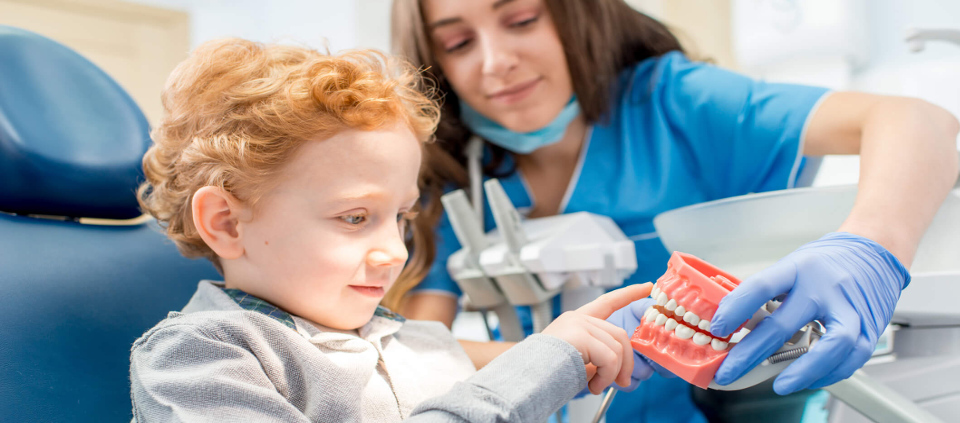Trusted Kid Dentist Near Me for Friendly and Fun Dental Visits
Wiki Article
Pediatric Dental Emergencies: What Parents Need to Know for Quick and Effective Treatment
In the world of pediatric healthcare, dental emergency situations can arise suddenly, leaving parents unclear of exactly how to manage the situation effectively. Comprehending the indicators, kinds of injuries, and prompt activities to take can make a substantial distinction in the outcome for a kid's dental wellness. With a quick and proper response, parents can alleviate potential long-term repercussions and guarantee their child gets the essential care immediately. By being prepared and notified, moms and dads can play a critical role in protecting their youngster's oral health.Indicators of Pediatric Dental Emergencies
When evaluating pediatric oral emergency situations, it is essential for parents to be alert for specific indicators showing possible significant concerns. Among the key signs of an oral emergency situation in youngsters is relentless tooth discomfort that is not relieved by over-the-counter pain medications. This might indicate an underlying infection or damage that calls for prompt focus from a dentist. Swelling in the gums, face, or jaw location is an additional warning that must not be disregarded, as it might be a sign of an abscess or other major dental problem.
Usual Types of Dental Injuries
Usual kinds of dental injuries in youngsters usually result from accidents or sports-related tasks that can result in various kinds of trauma to the mouth and teeth. One usual oral injury is a fractured tooth, which can vary from a minor chip to a more extreme break including the internal layers of the tooth. One more regular injury is a knocked-out tooth, where immediate activity is important to increase the opportunities of conserving the tooth. Children might additionally experience dental injuries like tooth breach, where the tooth is pushed right into the jawbone, or avulsion, which is the complete variation of a tooth from its outlet. Additionally, dental injuries can consist of luxation, where the tooth is removed but not totally knocked out, or soft cells injuries to the gums, lips, or tongue. It is essential for moms and dads to be familiar with these typical types of oral injuries to offer punctual and suitable treatment in case of emergencies.Immediate First Help Measures
Upon coming across a pediatric oral emergency situation, swift and suitable very first help measures are critical to minimize pain and prevent more problems. For a knocked-out tooth, instruct the youngster to gently rinse the tooth with water, trying not to touch the root, and area it back in the outlet ideally. If re-implantation is not practical, keep the tooth in a container of milk or the child's saliva till reaching the dental professional. In instances of a broken or broke tooth, wash the mouth with cozy water and use a cool compress to decrease swelling. A bitten lip or tongue must be cleansed delicately with water, and a cold compress can aid minimize pain and lower swelling. For objects stuck in between teeth, prevent making use of sharp devices and rather urge the youngster to delicately floss to remove the product. In all instances, it is important to call a pediatric dentist immediately for more evaluation and treatment.When to Seek Specialist Help
Looking for prompt oral care from a pediatric expert is important in dealing with prospective difficulties developing from pediatric dental emergency situations. Parents must seek expert aid instantly if their youngster experiences extreme tooth pain, face swelling, bleeding that does not stop, a knocked-out permanent tooth, or any kind of injury to the mouth or face. These indications suggest a major oral problem that requires immediate attention from a pediatric dental professional.In addition, if a kid suffers consistent tooth level of sensitivity to hot or cold, trouble eating or ingesting, or signs of infection such as pus around the gum tissues, moms and dads should not delay in seeking specialist dental care. These signs and symptoms could suggest underlying oral issues that need to be resolved without delay to avoid additional complications.
In instances of dental emergencies, it is critical for parents to call a pediatric dental expert as quickly as possible to make sure proper diagnosis and you could try this out therapy - kid dentist near me. Delaying professional help can bring about exacerbated dental check out here concerns and extended pain for the child

Stopping Future Oral Emergencies
To lower the likelihood of future oral emergencies, parents ought to prioritize regular oral hygiene techniques and routine sees to a pediatric dental practitioner for preventive treatment. Urging youngsters to brush their teeth twice a day with fluoride tooth paste and teaching them the appropriate strategy for two minutes each time can considerably decrease the threat of dental problems. Flossing daily is additionally crucial to eliminate plaque and food fragments in between teeth, where a toothbrush can not reach. In addition, restricting sugary treats and beverages can assist stop dental caries and cavities.Routine visits to a pediatric dental practitioner for exams and cleansings are necessary for early detection of any type of potential oral problems. These visits permit the dental expert to keep an eye on the kid's dental wellness, give expert cleansings to remove plaque and tartar accumulation, use fluoride therapies for included defense, and offer guidance on correct dental care strategies.
Conclusion
In conclusion, parents should recognize the signs of pediatric oral emergencies, common kinds of dental injuries, prompt emergency treatment actions, and when to seek specialist assistance. By taking positive steps to protect against future oral emergencies, moms and dads can make certain fast and reliable treatment for their kids. It is click this link very important to stay notified and prepared in order to manage any type of dental emergency situation that may occur.Report this wiki page